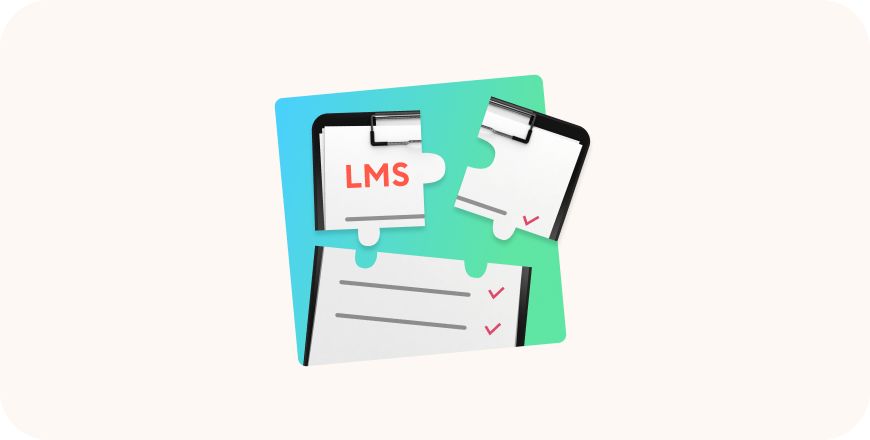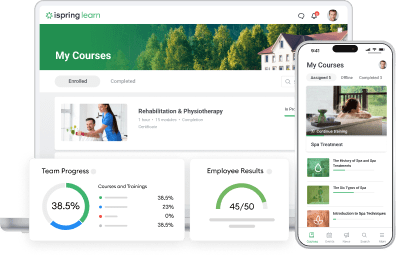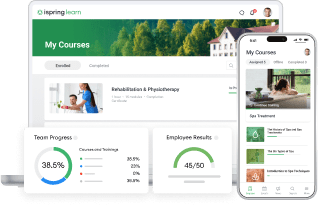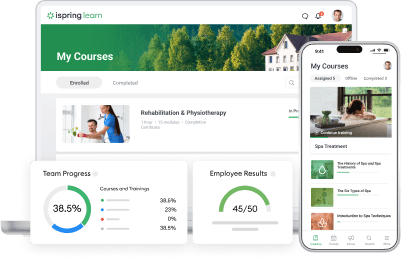The 10 Best Corporate Learning Management Systems (LMS) in 2025

In this article, we’ll explore what a corporate LMS is and how it can benefit your business. We’ll also highlight the top ten training platforms available on the market, so you can make an informed decision about which learning platform is the best fit for your training needs.
With over 800 LMS vendors in the market, choosing the right one can be a daunting task. Here’s an overview of the ten most effective and trusted solutions.
Take a look at this comparison chart of the best corporate learning management systems (LMSs) for a quick overview. Read on to get the details of each platform.
| LMS Name | Short Description | Pricing |
| iSpring Learn | A user-friendly platform for full-cycle training with multimedia course creation and unique features like skills evaluation and an interactive organization chart. Affordable for SMBs. | Starts at $6.64/user/month for 100 active users |
| Docebo | An AI-driven platform for personalized learning experiences, social learning, and integration with popular platforms. | Available upon request |
| LearnUpon | A streamlined platform for importing courses, robust reporting, and customization. Ideal for compliance training with extensive integration capabilities. | Starts at $1,249/month for up to 150 users |
| TalentLMS | Quick setup with features for onboarding, social learning, and access to a course store. Suitable for blended training initiatives in various sectors. | Starts at $59/month for up to 40 users |
| Absorb | A scalable platform with customization options for compliance training and skills gap bridging. Ideal for large enterprises. | Available upon request |
| Litmos | An intuitive platform with extensive content options and integration capabilities. It provides streamlined training experiences for businesses. | Available upon request |
| eFront | A customizable LMS with targeted learning paths and compliance-focused tools. Ideal for complex learning environments. | Starts at $1,000/month for up to 1,000 users |
| Bridge | An integrated platform with tailored assessments and flexible course creation. Suitable for employee development initiatives. | Available upon request |
| Adobe Learning Manager | An AI-driven platform for providing personalized learning journeys with a unique skills set feature. | Available upon request |
| Moodle Workplace | A corporate learning platform that combines the best features of the open-source Moodle LMS with advanced workplace learning tools. | Available upon request |
How We Selected the Best Learning Management Systems for Corporate Training
To select the best LMSs for companies, we relied on data from reputable sources like G2 and Capterra, which showcase the most popular platforms on the market.
Our approach encompassed both standalone LMS offerings and comprehensive corporate solutions with additional features like skills management and career development.
We conducted a thorough review of vendors’ websites, assessing their training capabilities, strengths, and standout features, and explored user reviews as well.
The resulting list represents a diverse range of LMS solutions, catering to different organizational needs and preferences.
The 10 Best Corporate Learning Management Systems
Here you’ll find detailed descriptions of each corporate training platform, with their key features, unique selling points, and pricing.
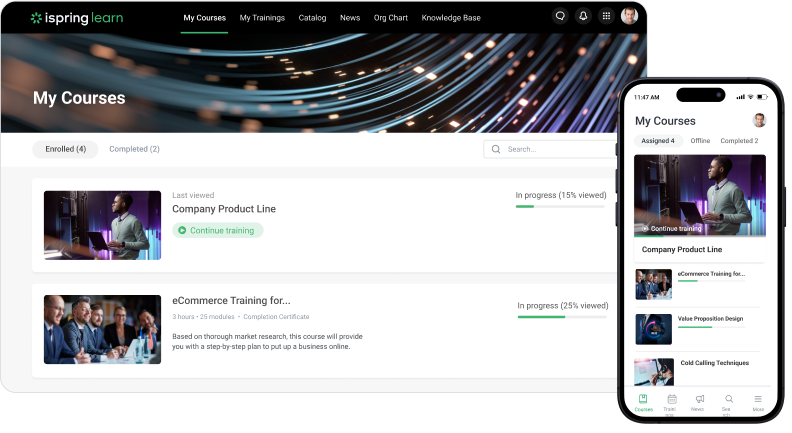
iSpring Learn is the best corporate LMS designed for companies that need a user-friendly training platform packed with robust features. It powers the full cycle of training, from course creation and automated content delivery to smart user management and result tracking. It offers a built-in online tool for creating multimedia-rich courses and quizzes. Additionally, it comes with a desktop tool that allows for advanced training content creation — you can craft role-plays, video tutorials, drag-and-drop activities, and more.
One of its key strengths is its ability to facilitate blended learning programs, combining self-paced online courses with online training sessions through a seamless integration with Zoom or Microsoft Teams.
Moreover, iSpring Learn offers unique LMS features, such as an interactive organization chart, a course catalog for self-enrollment, a newsfeed, a supervisor dashboard, and a tool for evaluating soft skills. Despite its extensive functionality, iSpring Learn remains easy to use and affordable, making it an attractive LMS for small businesses and medium-sized companies.
Key features of this corporate LMS:
- Automated training
- Detailed progress reports in real time
- A library of ready-made courses on soft skills and compliance
- Personalized learning paths
- SCORM-compliant LMS
- A native app for mobile learning
- Video conferencing via integration with Zoom or MS Teams
- Integration with Salesforce, Bitrix24, BambooHR, PeopleWeek, Shopify, and other popular services
- Supervisor dashboard
Unique selling points:
- A built-in AI-powered tool for creating simple online courses and quizzes
- An integrated authoring tool for building professional courses with assessments and role-play simulations
- Social learning features (a newsfeed, learner cards, an interactive organization chart, etc.)
- 360-degree feedback assessment
- Observation checklists for on-the-job training
- Top-notch customer service
- Free full-featured trial
Best for:
iSpring Learn is best suited for businesses seeking a user-friendly and scalable LMS to deliver effective and engaging training programs. Its robust features support diverse learning objectives, from onboarding and compliance to continuous professional development.
Pricing
A free 30-day trial is available. Paid plans vary based on the total number of users, starting at $6.64 per user/month for a total of 100 active users. This LMS vendor uses the pay-per-active-user pricing model, so you are only billed for users who are active during a given month.
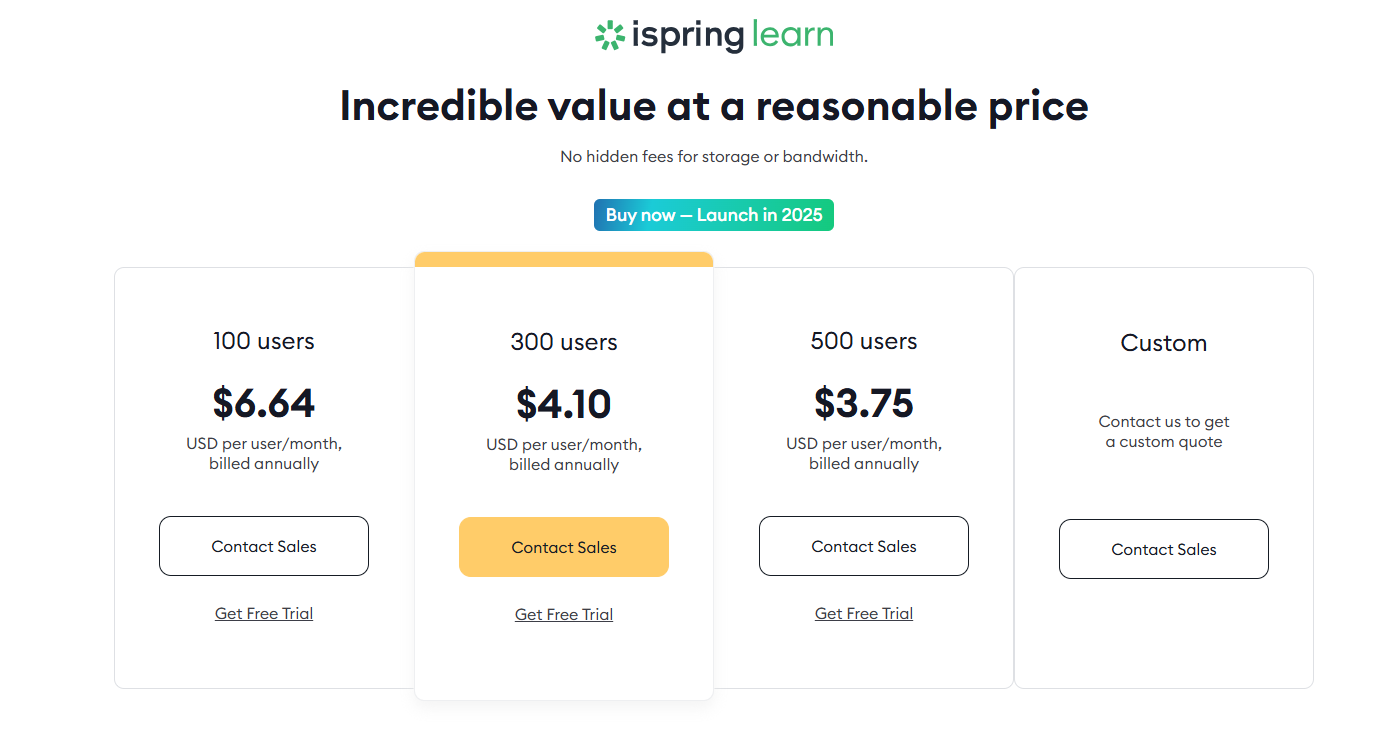
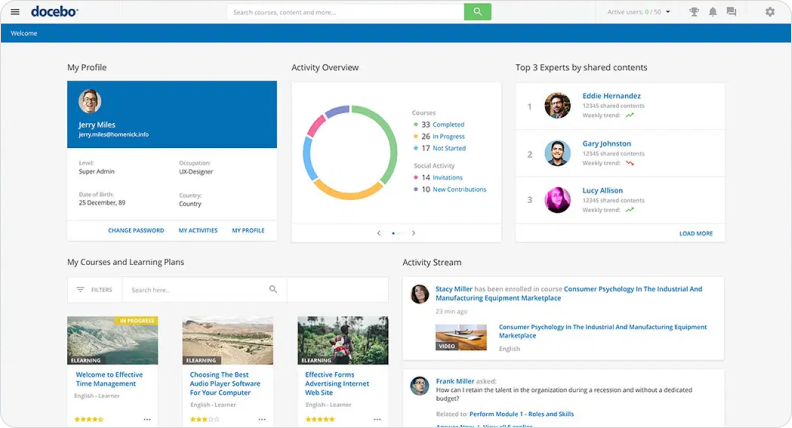
Docebo is one of the best learning management systems for business that leverages artificial intelligence (AI) to deliver personalized learning experiences.
It allows employers to enroll employees in mandatory training programs, while also enabling self-directed learning. The platform’s AI-powered Deep Search feature simplifies content discovery, while the Docebo Learner Coach recommends relevant training materials.
Furthermore, Docebo provides personalized training content suggestions based on user interests and popular course options. It also offers robust social learning functionality, allowing employees to share content, ask questions, and provide feedback, fostering collaboration within the organization.
Key features of this LMS for corporate training:
- A library of off-the-shelf training content
- Robust platform customization features
- Mobile learning
- Personalized learning paths
- Integrates with more than 400 platforms and services, including popular tools like Shopify, WooCommerce, Stripe, and PayPal
- Custom progress reports
- Compliant with WCAG 2.1 AA for accessibility
Unique selling points:
- AI-powered technology for virtual coaching, auto-tagging, and content suggestions
- Advanced social learning tools (learning communities, discussion forums, user-generated content, learner profiles, etc.)
- Skills management
- Custom dashboards
- White-labeling
Best for:
Docebo is a good fit for mid to large-sized enterprises looking for a scalable AI-powered corporate LMS. It’s ideal for enhancing employee skills and ensuring compliance across diverse industries.
Pricing:
Available upon request.
Also read → The Top 3 Docebo Alternatives: iSpring, Cornerstone, and LearnWorlds
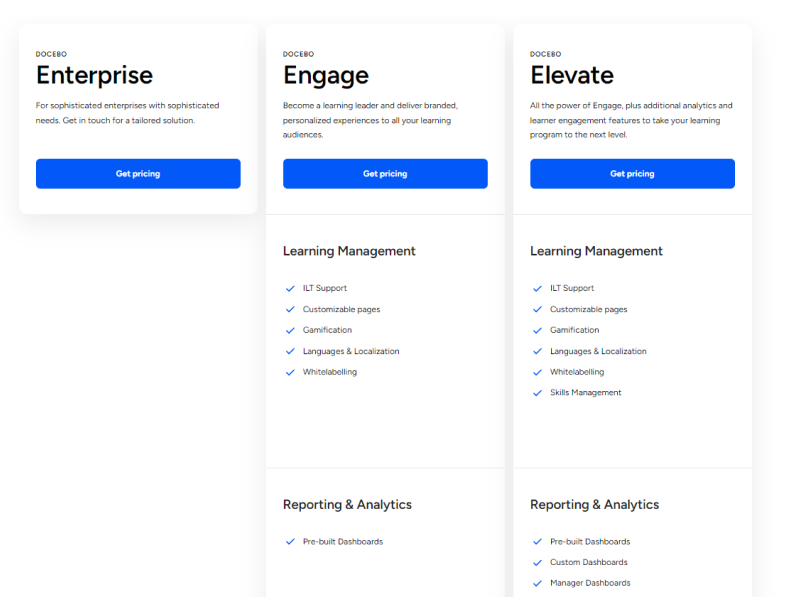
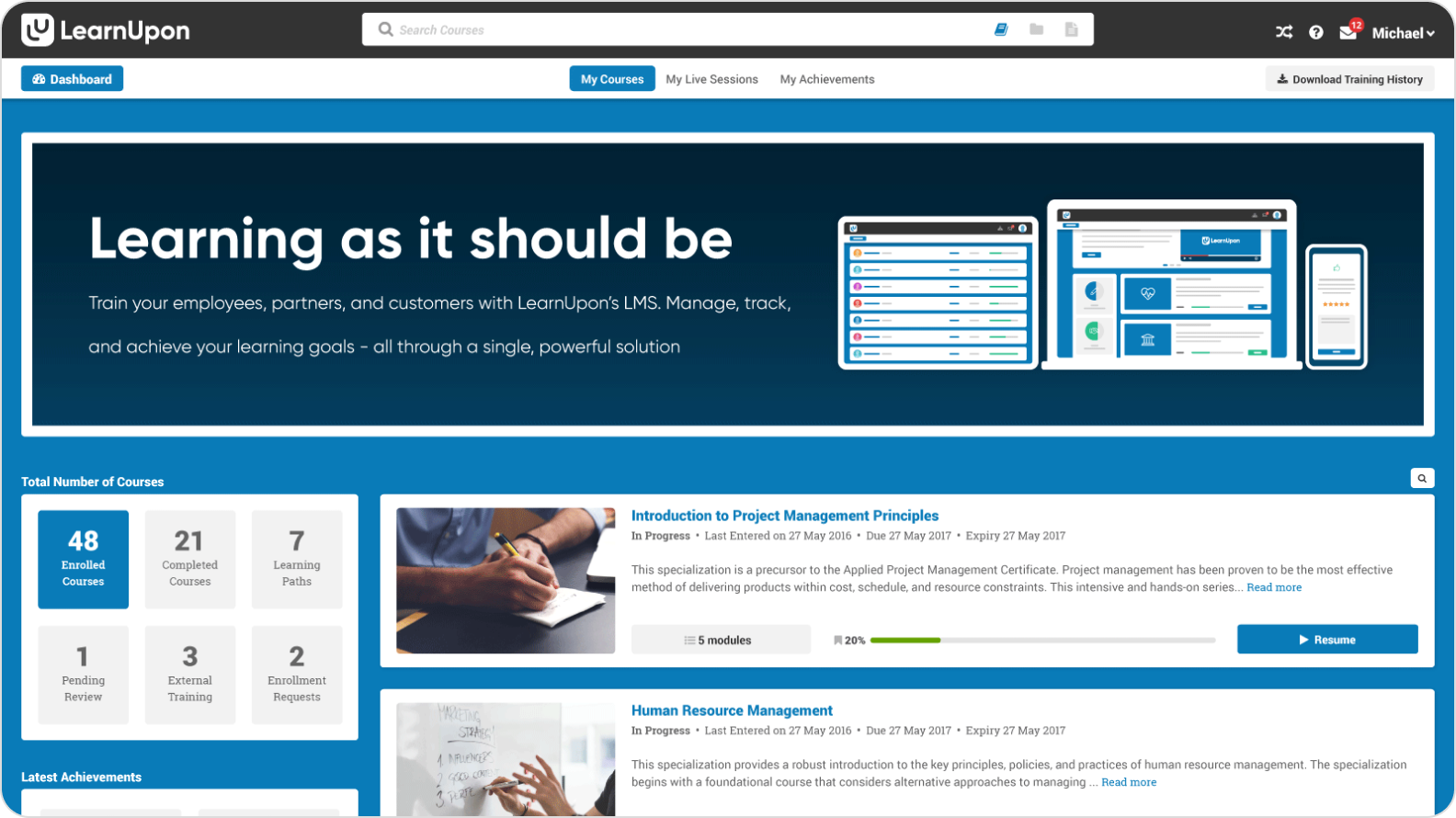
LearnUpon is among the leading corporate training platforms that simplify the delivery of impactful online learning experiences. Creating talent development programs is straightforward with this platform: you can import SCORM and xAPI courses, upload videos, add presentations and documents, and include video conferencing sessions.
Some of its notable strengths are a robust reporting system and analytics capabilities. LearnUpon enables the easy tracking of all employee training activities and provides insightful progress reports. Its pre-built reports, along with filtering options, dashboards, and automation features, streamline the process of monitoring learners’ training effectiveness.
Moreover, LearnUpon offers customization capabilities for organizations with multiple branches or entities. You can create and manage multiple portals, each with its own unique style and training content, to meet diverse training needs.
Key features of this corporate learning management system:
- Compliance-focused features, including automated certification management and audit trails
- A robust reporting and analytics dashboard
- Extensive integration options with popular business tools, such as Salesforce and Zendesk
- Advanced branding capabilities, such as white-labeling and custom domain support
Unique selling points:
- AI-powered learning tools (course and assessment builder, notifications, and automated feedback summaries)
- Multitenancy (unique branded portals for different audiences)
- Engagement features (leaderboards, discussion forums, multimedia banners, etc.)
Best for:
LearnUpon is a solid choice for enterprises that need a user-friendly LMS for training employees, partners, and members of an association. It’s also a great solution for customer training.
Pricing:
Starts at $1,249/month for up to 150 users.
Also read → 13 LMSs for Nonprofits: Discover The Top Picks for 2024
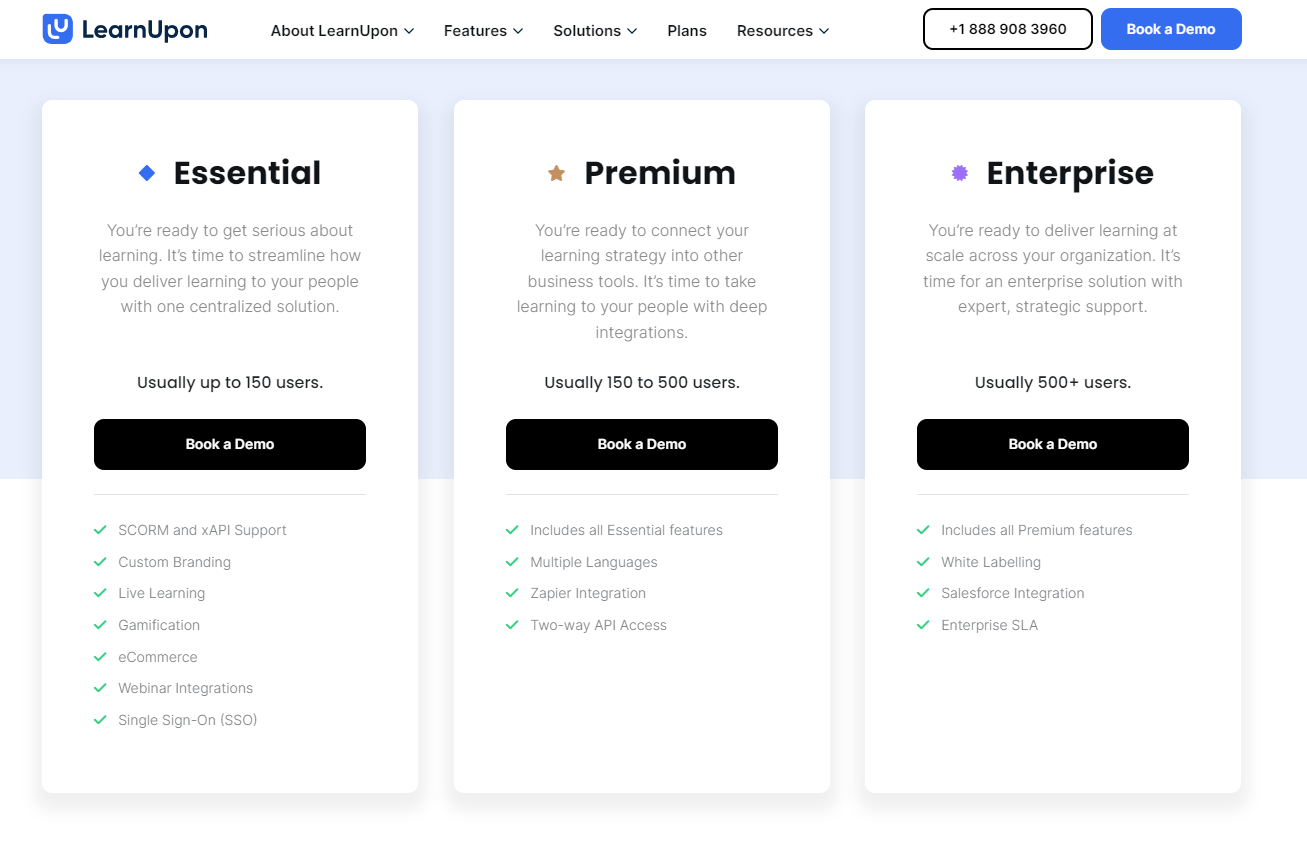
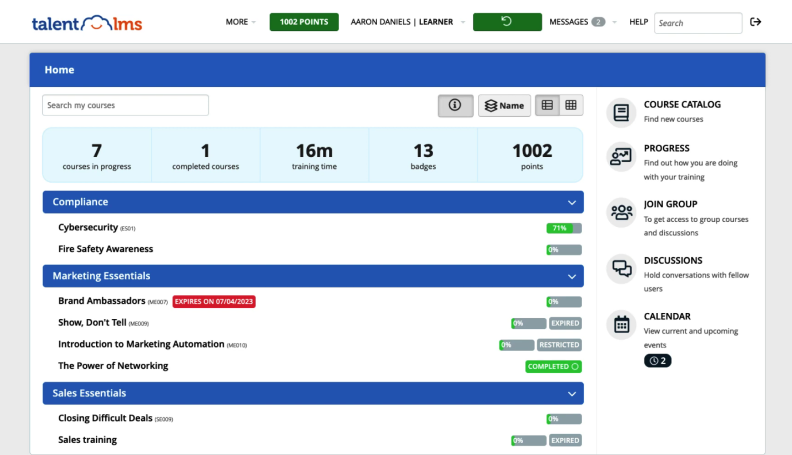
TalentLMS is a top-tier corporate learning management software that meets diverse learning objectives, offers quick setup, and provides robust features. It specializes in efficient onboarding processes and provides advanced tools for social learning, gamification, and ILT management, serving both internal and external training requirements.
Moreover, TalentLMS offers access to its course store, the Talent Library, through a subscription upgrade. This comprehensive content library features courses from TalentLMS and other reputable providers, giving users the flexibility to purchase individual courses or bundles based on their preferences.
Best suited for blended employee training, including onboarding and compliance, TalentLMS excels with its seamless onboarding process, making it perfect for short-term projects. Additionally, it integrates with popular platforms like Shopify, WooCommerce, Stripe, and PayPal seamlessly, catering to businesses that aim to monetize their online courses.
Key features of this corporate learning platform:
- Online quiz creation
- User management and role assignment
- Custom branding options
- Custom reporting and analytics
- Mobile learning app
- Gamification features
- Integrations with third-party tools
- Collaboration tools like forums and messaging
- E-commerce capabilities
Unique selling points:
- AI content generation (texts, images, lists, flashcards, tabs, labeled graphics, charts, multiple-choice questions, etc.)
- Assessment and survey engine
- Rich communication tools (private messages, a calendar, discussion forums)
- White-labeling, homepage builder
Best for:
TalentLMS is ideal for small to mid-sized businesses looking for a cost-effective, easy-to-use LMS software that enables the rapid deployment and management of corporate training.
Pricing:
Starts at $59/month for up to 40 users. There’s also a free plan for up to 5 users.
Also read → The Top 3 TalentLMS Alternatives to Switch to in 2024
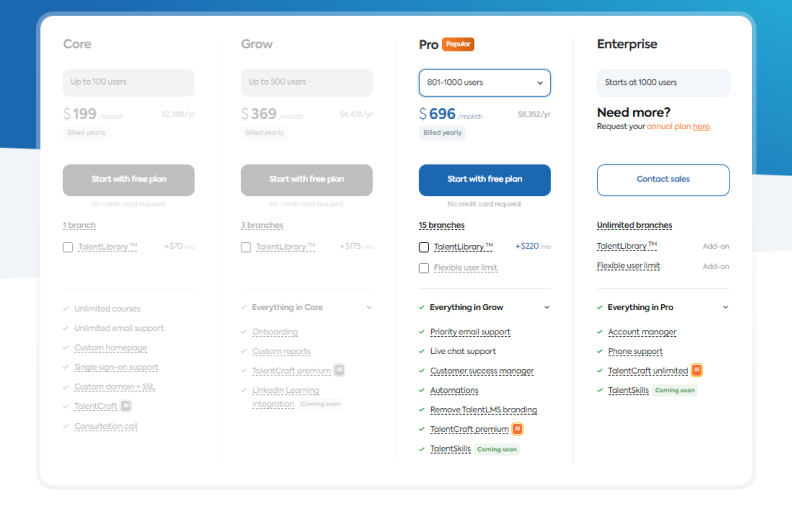
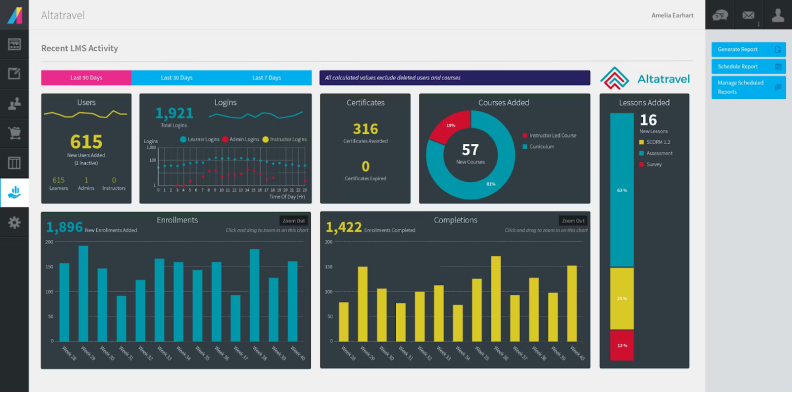
Absorb stands out as a leading cloud-based LMS software, being admired for its scalability and trusted by numerous blue-chip companies. Offering an intuitive user interface and a comprehensive feature set, Absorb delivers engaging training experiences across various domains, such as compliance training, employee onboarding, and skills gap bridging.
Key highlights include a user-friendly mobile app, robust reporting features, extensive customization options, and an integrated tool for building courses.
Primarily targeted toward large enterprise businesses with ample budgets, Absorb provides an impressive array of features and a scalable learning solution. While it is suitable for diverse industries, its premium pricing and advanced functionalities may not be ideal for beginners or businesses with constrained budgets. Given its initial setup time, due to its steep learning curve, Absorb is better suited for long-term projects.
Key features of this corporate learning management system:
- Powerful training automation tools
- Support for xAPI, SCORM, and AICC standards
- Customizable reporting and scheduling features
- Advanced platform customization options
- Seamless LMS integrations with third-party systems like Salesforce, Zoom, and BambooHR
- Access to a third-party course library
- Built-in course authoring tool
- Support for SAML2/API Integration
- Issuance of certificates of completion
- Enterprise-grade security standards, including role-based access controls, data encryption, and compliance certifications
Unique selling points:
- AI-powered tools (content creation tool, Intelligent Assist for task management, and intelligent recommendations)
- Tool for transcribing and timestamping video lessons
- Social profiles that enable learners to rate courses, interact with other learners, and share their accomplishments
- eSignatures for signing requirements while training
Best for:
Absorb is ideal for businesses seeking a robust and flexible LMS to increase workforce engagement, enhance employees’ skills, and ensure compliance with company policies.
Pricing:
Available upon request.
Also read → The 7 Best Healthcare LMS Software: Top Picks and Reviews
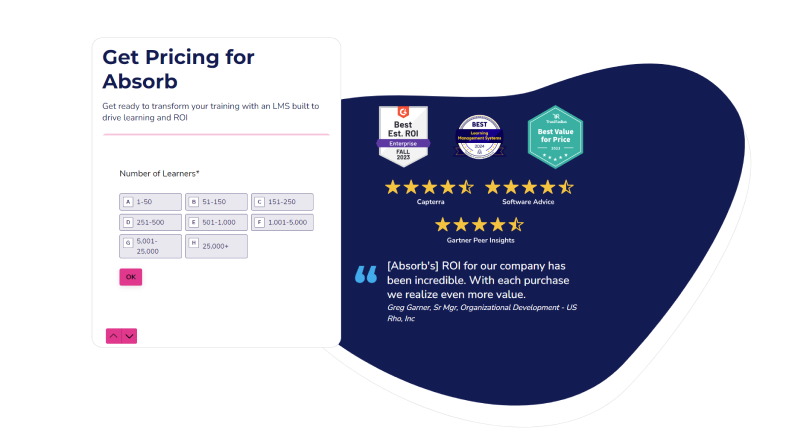
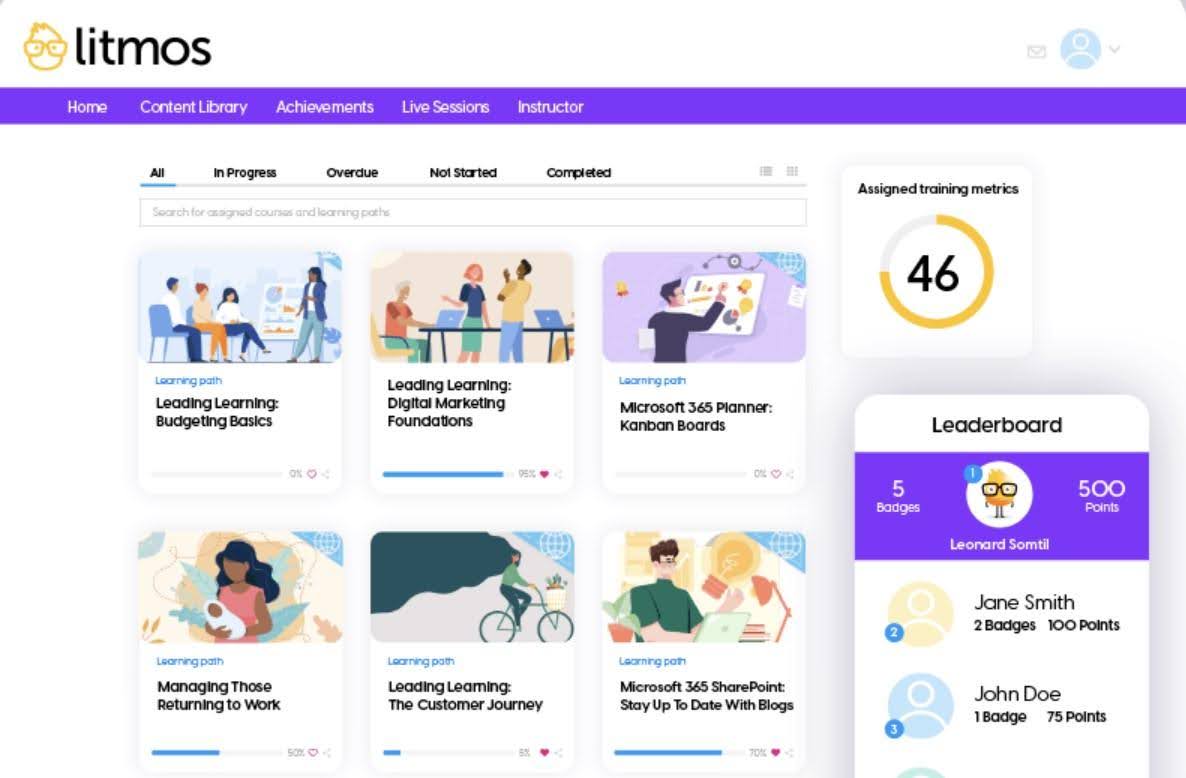
Litmos is a popular SaaS LMS that offers an intuitive user experience. Like iSpring Learn, it allows you to upload various types of content as course modules and organize them into learning paths. With its built-in authoring tool, you can create basic courses resembling text-filled pages.
A standout feature of Litmos is its extensive library of off-the-shelf content, covering topics such as compliance training and U.S. healthcare. This provides convenient access to ready-made courses, saving time and resources.
The platform connects with over 30 services, enhancing both the employees’ learning experience and the administrator’s workflow. It offers compatibility with popular webinar platforms like Zoom, Webex, and GoToTraining, as well as optional connections with tools like Zendesk and BambooHR. Additionally, its API allows for seamless integration with any other web application, ensuring flexibility and scalability.
Key features of this training tool:
- Advanced reporting and training analytics
- An extensive library of off-the-shelf courses
- AI-powered recommendation engine
- E-commerce features
- A wide range of integrations and add-ons
- Gamified learning
- Strong branding options
- A mobile-first design with native apps for iOS and Android devices
Unique selling points:
- An AI assistant that automates learning tasks
- A built-in content authoring tool for creating mobile responsive courses
- An AI-driven tool for creating video content with interactive assessments
- Multitenancy (separate platforms with custom branding and themes)
Best for:
The Litmos LMS is best for organizations that want to extend their training programs to customers, partners, and external audiences. It also provides a scalable solution for monetizing eLearning courses.
Pricing:
Available upon request.
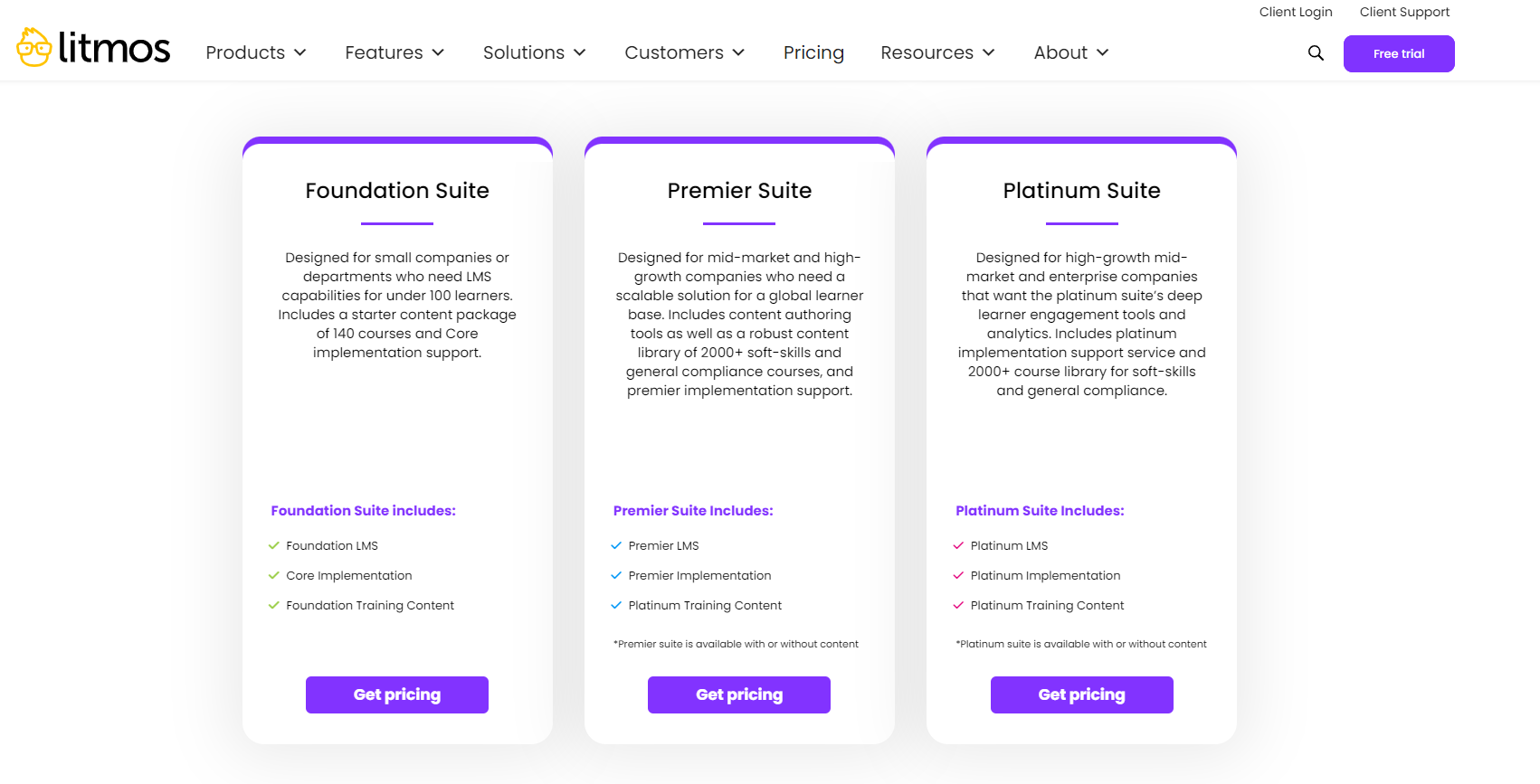
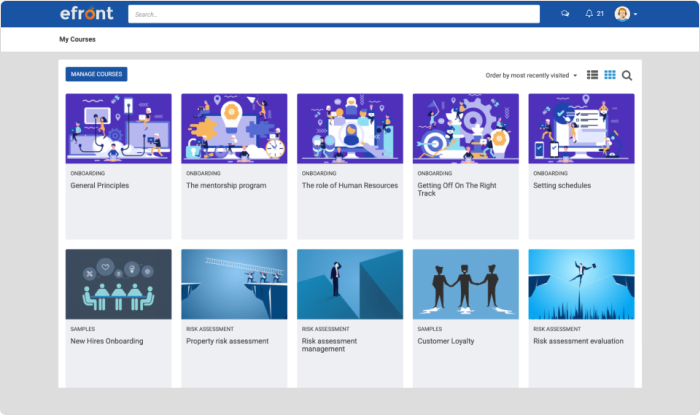
eFront is a robust extended enterprise LMS designed for complex learning environments. What sets it apart is its extensive customization options, allowing users to tailor their portals to their exact needs.
Users can customize their portal’s appearance with their themes and domain names. Additionally, eFront’s site builder tool lets users create modern multi-page websites within their portals. This flexibility extends to functionality, with native plug-ins and the ability to create custom plug-ins for specific requirements.
A standout and most useful feature is the Skills functionality, which enables targeted learning paths based on trainees’ specific skills. Users can also identify and address employee weaknesses through skill-gap tests and analyses, to ensure that learning programs are tailored to meet organizational needs effectively.
Key features of this corporate training software:
- Social learning features, such as discussion forums, chat rooms, and collaborative spaces
- Real-time employee progress reporting and analytics
- Mobile learning
- Single Sign-On (SAML, LDAP, and others)
- e-Commerce capabilities, including flexible pricing models, subscription management, and secure payment gateways
- Self-registration for learners (sign-up via Facebook, Google, etc.)
- A Salesforce plug-in
Unique selling points:
- Tools for creating online quizzes and surveys
- Rich communication tools (internal email, calendars, forums, and comments)
- Multitenancy (sub-portals for branch-specific training)
- Plug-in builder and website builder
Best for:
eFront is best for enterprises that need a highly customizable and secure learning management system for delivering tailored learning programs.
Pricing:
Starts at $1,200/month for up to 1,000 users.
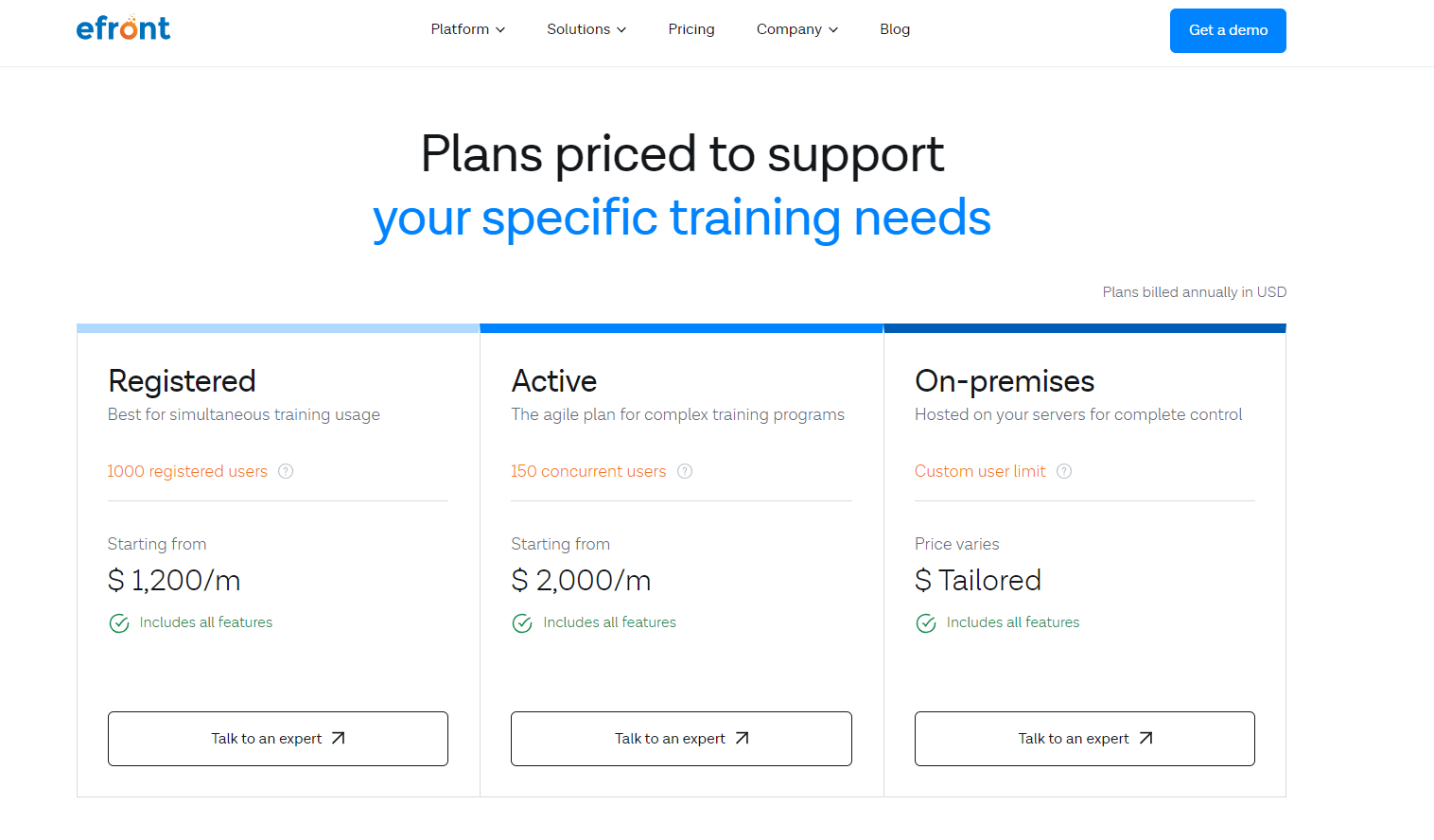
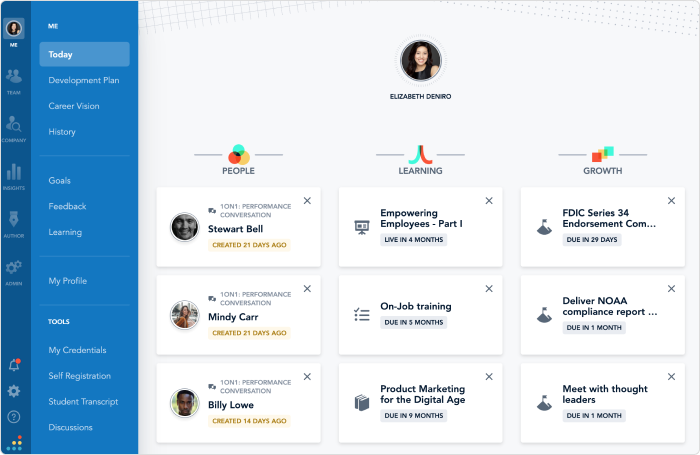
Bridge is the best LMS for businesses that integrate corporate LMS functionality with performance management and career development features. Similar to eFront, it facilitates the quick identification of training gaps and growth opportunities within your organization.
One notable aspect of Bridge is its ability to tailor assessments to each employee’s specific role, enabling targeted skill development. Additionally, the platform allows for real-time assessment of skill mastery, providing immediate feedback for continuous improvement.
With Bridge, you have the flexibility to create eLearning courses using the integrated authoring tool or access third-party content libraries such as LinkedIn Learning. This allows employees to self-enroll in courses that align with their learning objectives. Furthermore, you can curate a categorized catalog of content, providing learners with a wide range of options for self-enrollment.
Key features of this corporate LMS:
- Integrated learning and performance management
- Customizable learning pathways
- Built-in content creation tools
- Social learning features
- Compliance tracking
- Learner progress reporting and training ROI measurement
- Mobile accessibility
- Extensive integration capabilities
Unique selling points:
- A course creator with a built-in content library for building responsive eLearning
- A tool for recording training videos and translating them into 100+ languages
- Employee engagement surveys
- Employee performance reviews
- An AI-powered skill management tool
Best for:
Bridge is best for organizations that prioritize employee engagement and development. It’s a good choice for companies that want to foster continuous learning and growth within their workforce.
Pricing:
Available upon request.
Also read → The Best Employee Training Tracking Software
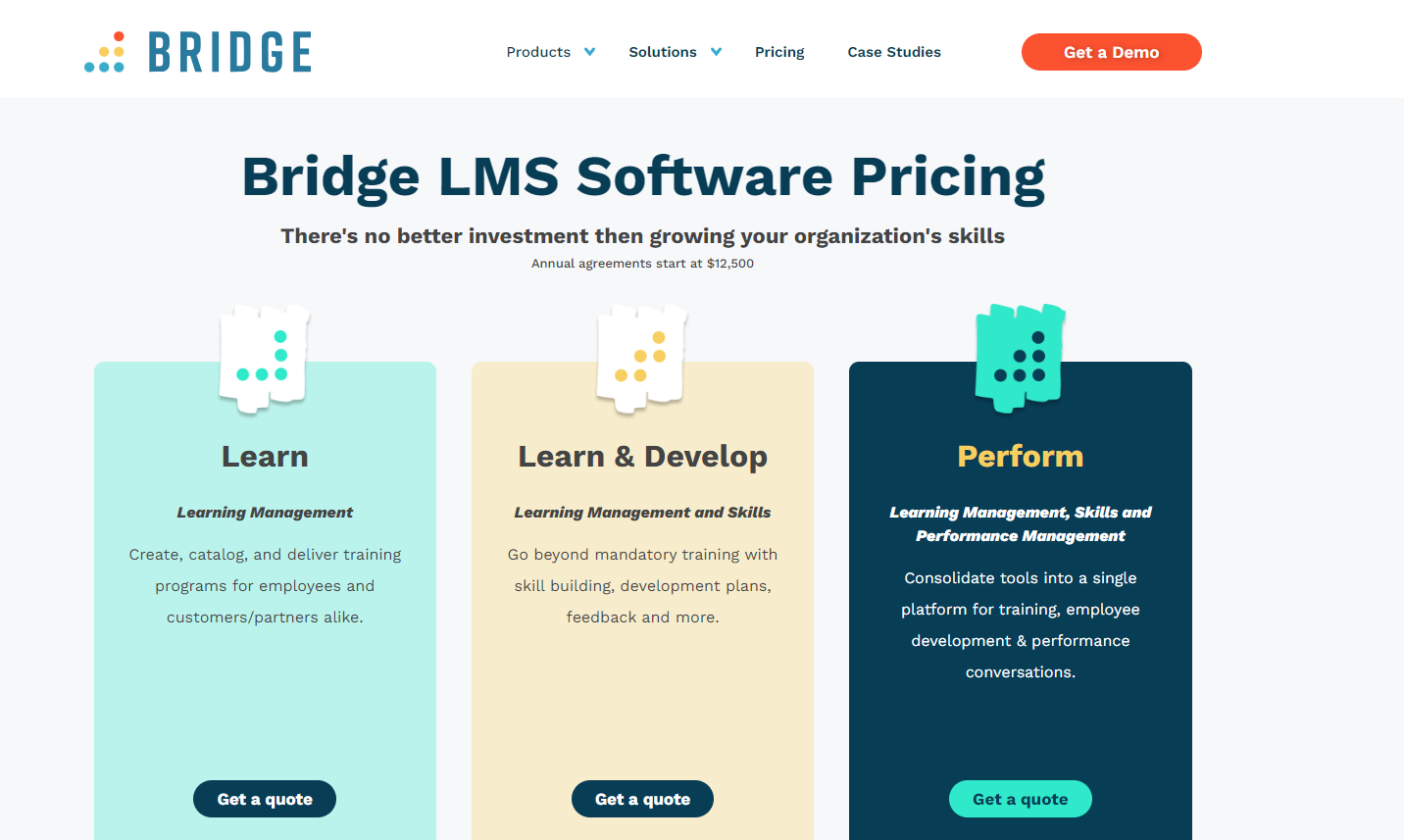
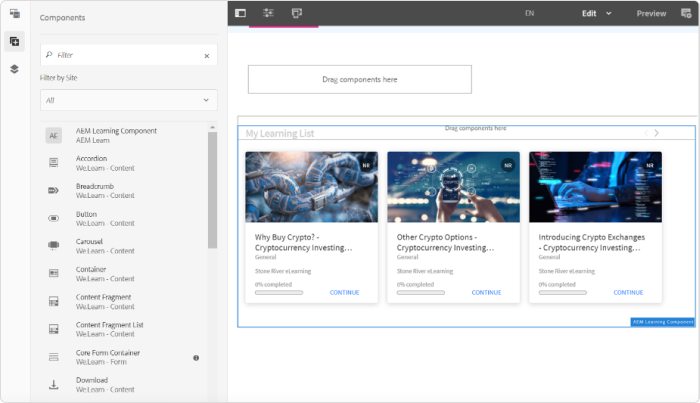
Adobe Learning Manager, previously known as Adobe Captivate Prime, is one of the best corporate learning management systems and is equipped with artificial intelligence (AI) and a machine learning (ML) engine to develop personalized learning journeys for employees.
Similar to Docebo, the platform harnesses learner data analysis to predict engaging content and offer tailored suggestions. What sets Adobe apart is its unique skills maps feature, which encompasses skill sets, knowledge, and employee traits. These maps empower organizations to establish and elevate performance expectations for their workforce.
When employees complete courses or learning programs with assigned skill credits, they acquire new skills, contributing to their professional development and organizational growth.
Key features of this corporate training LMS:
- Advanced social learning features
- Single Sign-On (SAML 2.0)
- Mobile-friendly design
- Compatibility with various eLearning standards (SCORM 1.2/2004, AICC, xAPI)
- Seamless integrations with Zoom and Salesforce, plus other Adobe products and services, such as Adobe Connect and Adobe Creative Cloud
- Robust reporting and analytics tools
- A documented API for custom integration apps
Unique selling points:
- Integration with a robust content authoring tool
- Personalized learner homepage
- An AI-powered recommendation engine
- Admin-recommended and peer-recommended widgets
- Skills management
- Multitenancy (customizable separate learning portals for different audiences)
- LCMS capabilities
Also read → LMS vs. LCMS: Which Is Right for Your Business
Best for:
Adobe Learning Manager is the best learning management system for enterprises that need a comprehensive platform for content delivery and management of corporate training programs.
Pricing:
Available upon request.
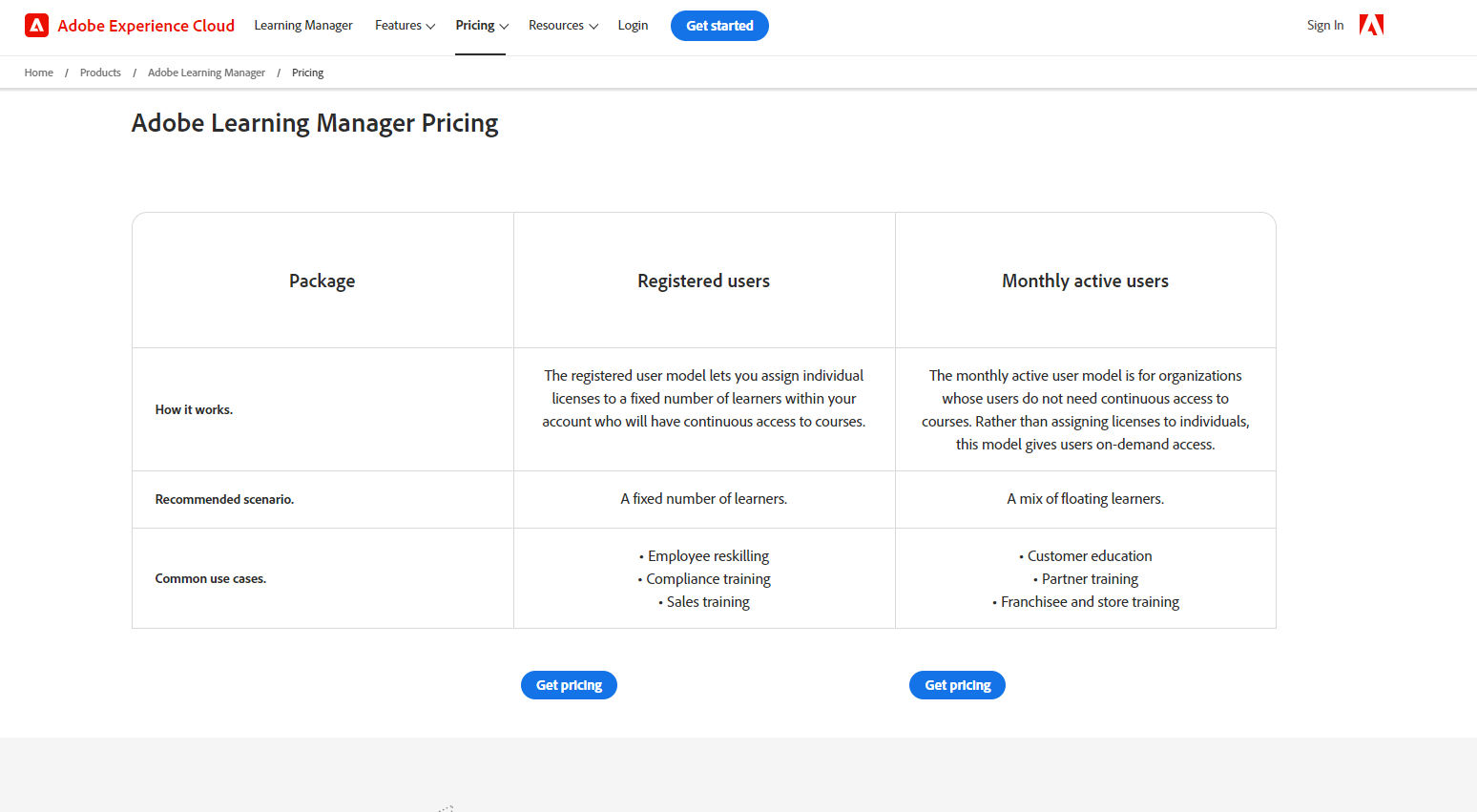
10. Moodle Workplace
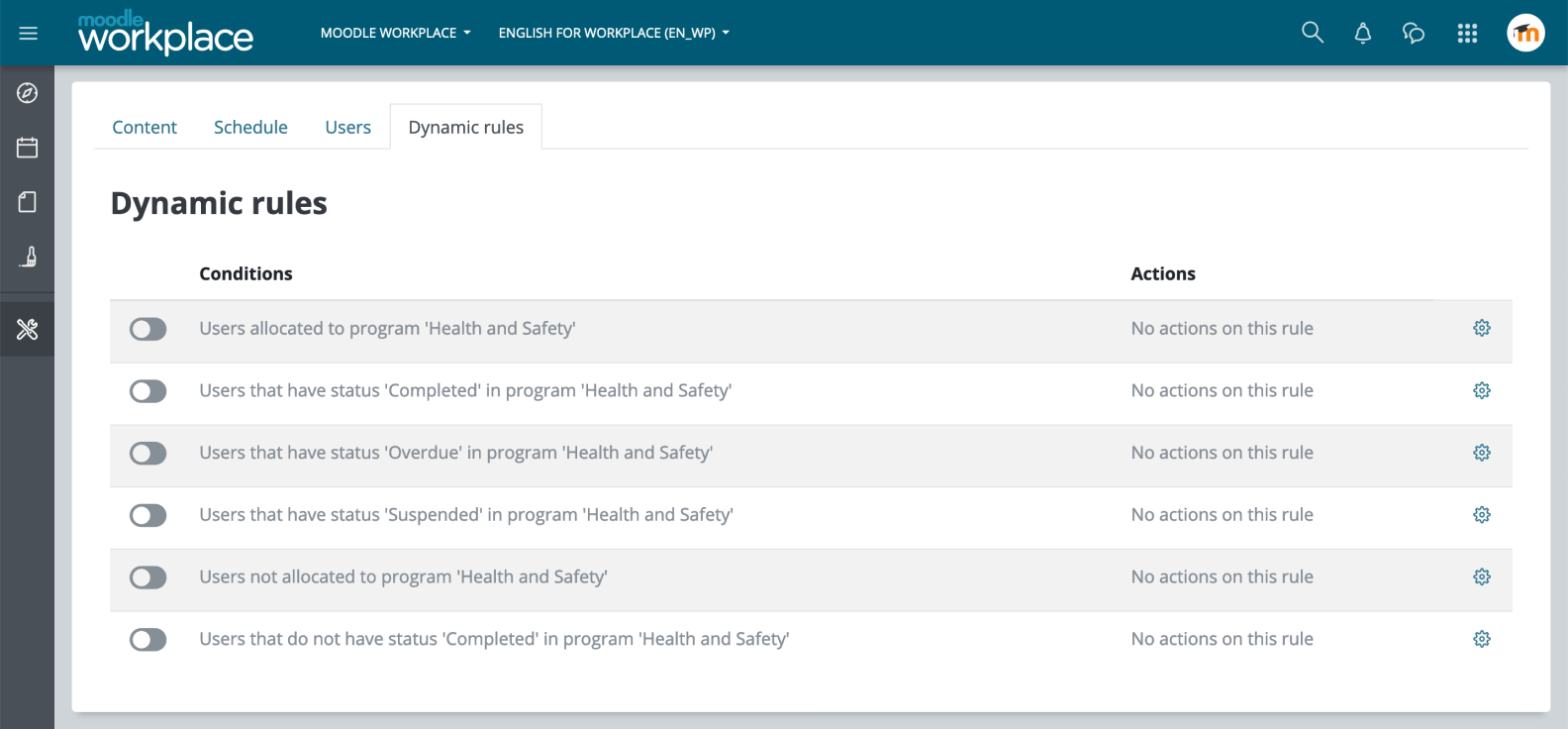
Moodle Worplace is one of the best corporate learning platforms for enhancing employee training and development. It combines the best features of the open-source Moodle LMS that is mostly used by K–12 and higher education institutions with advanced workplace learning tools, offering a comprehensive eLearning solution for businesses of all sizes.
The platform is highly customizable, allowing organizations to adapt it to their specific size, structure, and needs. It can be integrated seamlessly with your existing software ecosystem and enables you to deliver targeted content to different departments and branches through multiple platforms.
The advanced reporting tools offer powerful insights that allow you to revise and improve your courses and entire programs to drive better results. The smart tools for task automation that the platform comes with help save time, making your training processes more effective.
Key features of this corporate learning management system:
- Customizable learning journeys
- Seamless integration with other corporate software like HR systems
- User-friendly drag-and-drop interface
- Advanced reporting and analytics tools
- Automation of workflows
- Customizable learning pathways
Unique selling points:
- AI-powered open-source plug-ins
- The ability to assign learning and grant competencies to individuals or teams
- The recording of grades and achievements with Gradebook
- Multitenancy (customized learning environments for different groups of users)
- Built-in tools for managing privacy and site policies, age-of-consent checks, data requests, and more
Pricing:
Available upon request.
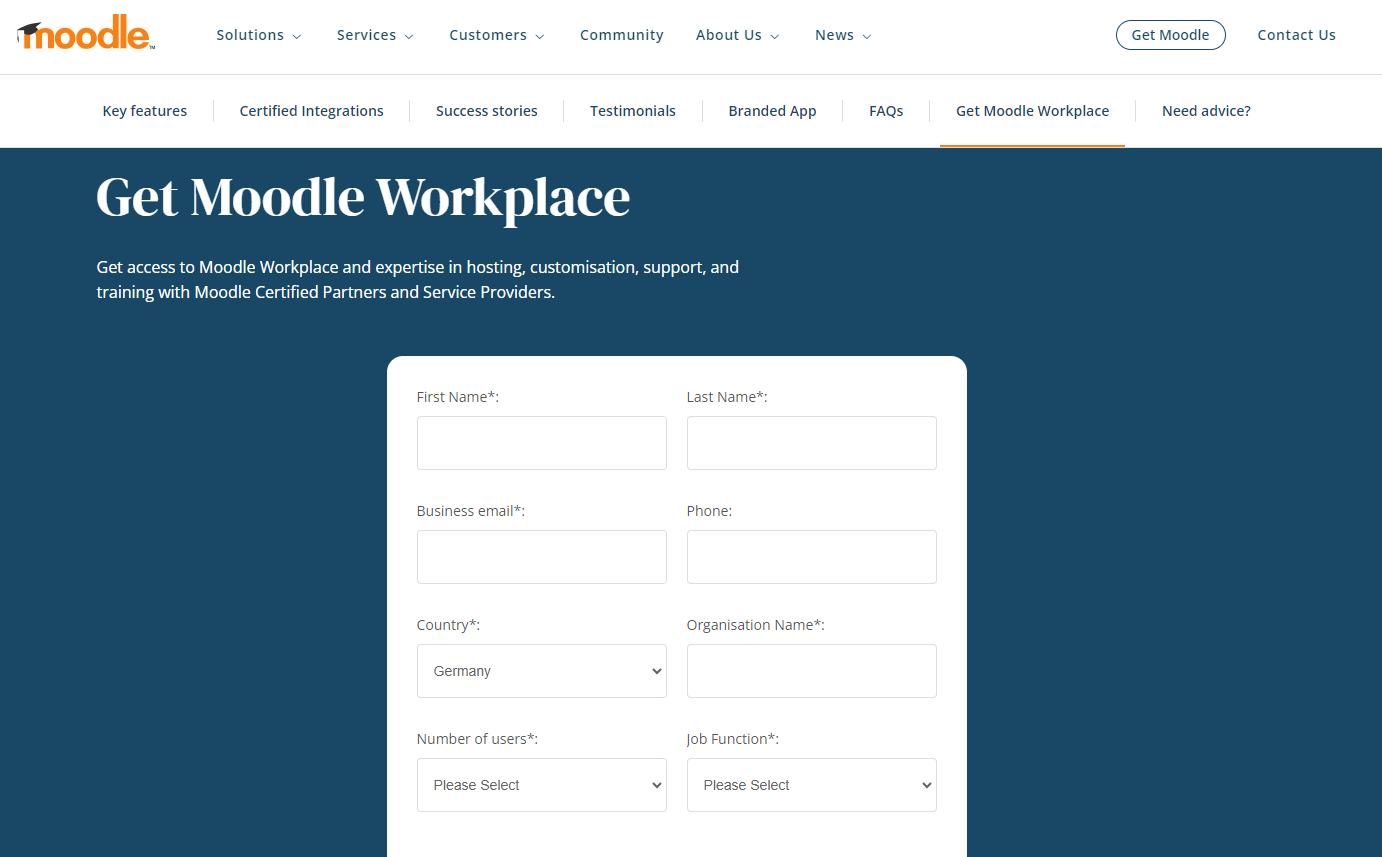
How Can Corporate LMS Software Help Your Business?
An LMS serves as a versatile solution that can address various employee training needs within companies effectively. Let’s explore the different training scenarios that can be covered with learning management software and how companies use it to meet their specific requirements.
New-hire orientation
With a corporate LMS platform, employee induction training becomes a streamlined process. HR managers can create a comprehensive training program or so-called “learning path” covering topics like company history, policies, culture, organizational structure, products, services, clients, and partners. This program is then assigned to all new hires, automating much of the induction process.
Outcomes: A robust induction training experience simplifies new hire adaptation, boosts retention rates, and accelerates the time needed to achieve productivity.
Once organizations have realized success with their orientation programs, they often expand their training offerings to cover more specific areas such as sales, operations, management, and even training on how to use company benefits or request vacation time.
Here are a few examples of how companies use their corporate LMS for targeted training:
Product knowledge training
Product learning serves as an integral component of both the new hire onboarding process and ongoing training for existing employees who want to refresh their product knowledge. With a corporate training LMS, organizations can also educate their staff about upcoming products or services before their official release.
A standard online product knowledge training course provides learners with detailed information about product features, benefits, and usage instructions. Typically, these courses include quizzes at the end to assess employees’ comprehension and determine if further training is necessary.
Outcomes: Comprehensive know-your-product training helps teams excel, resulting in improved sales and enhanced customer satisfaction.
Job-specific skills training
Job-specific skills are essential competencies required for particular roles. For instance, an architect needs CAD (computer-aided design) skills, a teacher must be good at lesson planning, and a programmer should have advanced coding abilities.
Training in job-specific skills is vital for employee development, particularly in technical fields where technology evolves rapidly. Even experienced employees need regular upskilling to stay current.
Corporate LMS software streamlines the process of providing ongoing training. It enables consistent employee engagement in learning activities and facilitates collaboration in developing new training materials and learning objects.
Outcomes: Employees remain updated on the latest developments in their field and enhance their performance accordingly.
Sales training and customer support training
Sales training equips learners with essential skills, such as anticipating customer needs, presenting products effectively, handling objections, and closing sales. On the other hand, customer service skills development focuses on making customers feel that they are heard, while also resolving their issues efficiently.
Read also:
LMS software streamlines the learning process by automating tasks and enhancing engagement. A corporate LMS enables the creation of visually appealing SCORM-compliant courses, facilitates knowledge assessment through online quizzes, and offers role-play simulations to develop sales and communication skills.
Outcomes: Well-equipped sales reps can boost sales figures, while proficient service and support teams can turn customer queries into opportunities for building brand loyalty.
Channel partner training
A corporate LMS platform allows you to train channel partners worldwide, providing them with valuable insights into products, development updates, new features, applications, and operational procedures. Additionally, partners can undergo compliance training and enhance their sales and customer service skills.
Outcomes: Online channel training enables companies to bolster their network and elevate overall business performance.
With a corporate training platform, you empower your employees and partners with continuous learning opportunities. This ongoing professional development is crucial for achieving organizational objectives and staying competitive in the market. So, investing in the right online eLearning platform leads to tangible growth and success.
Software Related to Corporate Learning Platforms
Let’s explore some types of software that are related to corporate training management software.
Authoring software
eLearning authoring tools are software used to develop digital learning content for delivery through an LMS. While these tools may vary in functionality and ease of use, some of the most popular options enable you to create interactive courses, video lectures, tutorials, quizzes, and simulations.
Certain corporate LMS platforms come equipped with integrated authoring tools, allowing users to construct comprehensive interactive courses, quizzes, role-play simulations, and branched scenarios. Some also have built-in course editors that allow users to create training content directly within the LMS environment.
Digital knowledge repositories
A digital knowledge repository serves as a centralized online hub for an organization’s learning content, essentially functioning as a corporate knowledge base. This training tool enables just-in-time online learning by providing employees with access to information whenever they need it. Additionally, users can engage in discussions, share knowledge, and contribute content to the repository.
Administrators can set permissions and establish policies to regulate access to information within the repository.
As a standalone solution, digital knowledge repositories are valuable for post-training support. They can also integrate with other corporate software solutions or LMS platforms to enhance their functionality and streamline access to learning resources across the organization.
Hosted course platforms
These platforms operate as online marketplaces, enabling end users to access a variety of courses from different vendors. They come equipped with e-commerce functionalities, allowing individuals and companies to both upload and sell their own courses. Essentially, they provide a convenient marketplace for buying and selling eLearning content, making it easy for users to access the courses they need.
Microlearning platforms
A microlearning platform is tailored to provide knowledge in quick, easily digestible chunks that integrate seamlessly into a daily workflow. This learning tool enables companies to create microcourses using existing materials or access the ready-made microlearning content that’s offered by the platform. Microlearning platforms prioritize agility and mobile accessibility, empowering employees to access task-oriented knowledge anytime and anywhere they need it.
While the market offers numerous employee training solutions, a corporate LMS can serve as a comprehensive, all-in-one training management system, effectively replacing many of them.
Now, let’s explore the various ways that training platforms can benefit your business.
FAQ on Corporate Learning Management Systems
Here you’ll find answers to the most frequently asked questions.
What is a corporate LMS?
A corporate learning management system (LMS) is software that makes it easy to manage, deliver, and track employee training within an organization. It serves as a single hub for all training activities, allowing companies to provide an effective learning experience to their employees.
What is a corporate LMS used for?
A corporate LMS helps businesses streamline the user administration, documentation, learner tracking, reporting, and delivery of training within a corporate environment. The primary uses of this training tool include onboarding, skills development, compliance training, and assessment and evaluation.
Who uses corporate LMSs?
They might be used by a variety of stakeholders within an organization, including learning and development (L&D) professionals, HR managers, team leaders, department heads, instructional designers, system administrators, and regulatory compliance managers.
What are some key features of a corporate training platform?
The essential features of a corporate learning management system include:
- Course management. Store, manage, and deliver training courses and other learning materials.
- User management. Enroll employees, assign roles, and manage user profiles.
- Tracking and reporting. Monitor learner progress, completion rates, and performance through detailed reports and analytics.
- Certification and compliance. Issue certificates upon training course completion and ensure compliance with industry standards and regulations.
- Mobile accessibility. Provide access to content on various devices, including smartphones and tablets, allowing mobile learning (mLearning).
- Integration. Integrate with other corporate systems, such as HR software, to streamline processes.
What are the benefits of a corporate LMS?
The value proposition of a corporate LMS lies in the following aspects:
- Centralized learning. All materials are stored in one place, making management and access extremely easy, and thereby enhancing the user experience.
- Consistency. Ensures that all employees receive the same quality training, regardless of where they’re located.
- Efficiency. Automates tasks like enrollment, tracking, and reporting, which helps save time and reduce errors.
- Cost-effectiveness. Cuts costs related to travel, printed materials, instructor fees, and training costs in general.
- Flexibility. Employees can learn at their own pace and schedule, which boosts engagement and retention.
Performance improvement. Enhances employees’ skills and knowledge, which leads to better job performance and productivity.
What types of corporate LMS exist?
There are various types of corporate LMS systems, each designed to meet specific organizational needs and structures. Here are the main ones:
- Cloud-based LMSs. These platforms are hosted on the vendor’s servers and accessed via the Internet. They are scalable and often feature regular updates and maintenance by the provider, enhancing the user experience with up-to-date features and seamless performance.
- On-premise LMSs. These solutions are installed on the organization’s servers. They offer greater control over data and customization but require in-house IT support.
- Open-source LMSs. These are free for anyone to use and modify. But they require strong technical expertise to customize and maintain.
What support options are available for corporate LMSs?
Support options for corporate LMSs can vary, depending on the provider and the type of LMS. Typically, they include:
- 24/7 customer support. Round-the-clock assistance via phone, email, and/or live chat to resolve any issues promptly.
- Online help centers. Comprehensive resources such as FAQs, user guides, and troubleshooting articles.
- Training and onboarding. Initial training sessions and ongoing support to help users get the most out of the LMS.
- Community forums. User communities where members can share tips, ask questions, and collaborate on solutions.
How to Choose the Best Corporate LMS
Choosing the right LMS for business training is a significant decision that requires careful consideration of a variety of factors. It’s essential to ensure that the selected LMS software addresses your organization’s needs effectively, meets training requirements, and aligns with budget constraints.
Here are some valuable resources to simplify the LMS selection process:
- A 5-step guide on how to choose an LMS
- A checklist of features and questions to discuss with an LMS vendor
- A guide on how to write an RFP (with samples and a free template)
- LMS migration: how to switch to another platform
Would you like to experience a corporate LMS firsthand? Take advantage of the iSpring Learn 30-day trial to explore all the features of our learning platform at no cost. Or you can book an LMS demo with one of our managers, who will guide you through how to manage your project tasks effectively using iSpring Learn.



